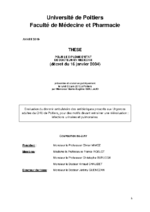Thèse d'exercice
Guillaud Marie-Eugène
Évaluation du devenir ambulatoire des antibiotiques prescrits aux Urgences adultes du CHU de Poitiers, pour des motifs devant entraîner une réévaluation : infections urinaires et pulmonaires.
FrançaisConsulter le texte intégral (format PDF)

Résumé
Français
Évaluation du devenir ambulatoire des antibiotiques prescrits aux Urgences adultes du CHU de Poitiers, pour des motifs devant entraîner une réévaluation : infections urinaires et pulmonaires.
INTRODUCTION : Les infections bactériennes sont un motif de recours fréquent au système de soins. La majorité des prescriptions d'antibiothérapies probabilistes qui en découlent devraient être réévaluée à 48-72 heures dans le but de limiter le développement de bactéries résistantes aux antibiotiques.
MATÉRIEL ET MÉTHODES : Il s'agissait d'une étude de cohorte prospective, observationnelle, monocentrique se déroulant aux Urgences du CHU de Poitiers du 03/12/2018 au 21/03/2019. L'objectif de cette étude était d'évaluer la réévaluation, par les médecins traitants, des antibiothérapies probabilistes initiées aux urgences. Les objectifs secondaires étaient d'évaluer la conformité et le taux de modification de l'antibiothérapie probabiliste.
RÉSULTATS : Cent neuf patients ont été inclus. Quarante-quatre patients (40.4%) ont été réévalués. Quatorze antibiothérapies probabilistes (12.8%) ont été modifiées lors de la réévaluation dont 3 (2.8%) arrêtées. Seul 3 (2.8%) ont été modifiées selon le résultat de l'ECBU. Cinquante-quatre médecins (70.1%) n'ont pas eu accès aux examens microbiologiques lors de la réévaluation. En probabiliste, 60 % des prescriptions étaient adaptées aux recommandations nationales.
CONCLUSION : L'étude met en évidence une réévaluation des prescriptions d'antibiotiques aux Urgences, pour des patients ambulatoires, non satisfaisante. Des mesures correctrices devront être mises en place et évaluées à travers un nouveau travail.
Mots-clés libres : Reassessment, Antibiotic, Emergency Services (ER in the US or A&E in the UK), Outpatient servics and clinic, Antibiotic Resistance (AR or ABR). .
- Médecine d'urgence
- Coopération médicale
- Médecins généralistes
- Antibiothérapie
- Résistance aux antibiotiques
English
INTRODUCTION: Bacterial infections are the most frequent reasons why people resort to the Health Insurance System. Most of the ensuing probabilistic antibiotic prescriptions should be reassessed 48 to 72 hours later in order to slow down and decrease therapies and thus prevent the spread of antibiotic resistance (ABR).
TOOL AND METHODS: It dealt with a four-month prospective, observational trial at the sole University Hospital of Poitiers from 03/12/2018 to 21/03/2019. The aim of the study was to measure the reassessment of antibiotic treatments given by the emergency services (or post-discharge treatments) by the general practitioner (GP). Secondary objectives were to measure the conformity as well as the modifying rates of the probabilistic antibiotic therapy.
RESULTS: A hundred and nine patients were included. Forty four patients (40.4%) were reassessed. Fourteen probabilistic antibiotic therapies (12.8%) were modified during the patient's aftercare, three of them (2.8%) being stopped during this follow-up. Only 3 (2.8%) were modified following the result of the cell and bacteria urinalysis. Fifty-four GPs (70.1%) did not have access to the microbiological analysis while reassessing. Concerning the prospective randomized study, 60% of the prescriptions were adapted to the national recommendations.
CONCLUSION: The study reveals that the reassessment of the emergency antibiotic prescriptions is not satisfactory for outpatients. Staff checking measures should be implemented and adjusted during a new study.
Notice
- Diplôme :
- Diplôme d'état de médecine
- Établissement de soutenance :
- Université de Poitiers
- UFR, institut ou école :
- Domaine de recherche :
- Médecine. Médecine générale
- Directeur(s) du travail :
- Jeremy Guenezan
- Date de soutenance :
- 03 juin 2019
- Président du jury :
- Olivier Mimoz
- Membres du jury :
- France Cazenave-Roblot, Christophe Burucoa, Arnaud Chaudet
Menu :
-
-
à propos d'UPétille
-
Voir aussi
Annexe :

-
Une question ?
Avec le service Ubib.fr, posez votre question par chat à un bibliothécaire dans la fenêtre ci-dessous ou par messagerie électronique 7j/7 - 24h/24h, une réponse vous sera adressée sous 48h.
Accédez au formulaire...
Université de Poitiers - 15, rue de l'Hôtel Dieu - 86034 POITIERS Cedex - France - Tél : (33) (0)5 49 45 30 00 - Fax : (33) (0)5 49 45 30 50
petille@support.univ-poitiers.fr -
Crédits et mentions légales
